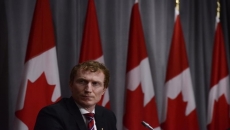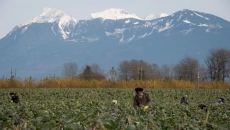The Supreme Court of Canada has cleared the way for Uber drivers to take the next step in their fight to be recognized as employees.
In a ruling Friday, the high court upheld an Ontario Court of Appeal decision that opened the door to a class-action suit aimed at securing a minimum wage, vacation pay and other benefits for drivers.
The man behind the planned class action, David Heller, is a Toronto driver for UberEats, a service that delivers food from restaurants to customers at home.
He argues that Uber drivers are employees, which entitles them to protections under Ontario's Employment Standards Act.
Uber, a global company that operates in more than 600 cities, has been present in Ontario for eight years.
To become an Uber driver, Heller had to accept the terms of the firm's standard services agreement.
Ontario's highest court said a clause in the agreement that requires all disputes to go through arbitration in the Netherlands was an unfair bargain and amounted to contracting out of an employment standard.
Heller earns about $400 to $600 a week before paying taxes and expenses, using his own vehicle and working 40 to 50 hours a week, amounting to revenue between approximately $21,000 and $31,000 annually.
He says this works out to $10 to $12 an hour, while the minimum wage in Ontario is $14 an hour.
The mediation and arbitration process entails up-front administrative and filing fees of US$14,500, plus legal fees and other costs.
In its decision, the Supreme Court said the arbitration agreement is invalid, noting someone in Heller's position could not be expected to appreciate the financial and legal implications of the arbitration clause.
"We agree with the Court of Appeal. This is an arbitration agreement that makes it impossible for one party to arbitrate," said seven of the nine high court justices.
"There was clearly inequality of bargaining power between Uber and Mr. Heller. The arbitration agreement was part of a standard form contract. Mr. Heller was powerless to negotiate any of its terms. His only contractual option was to accept or reject it," wrote Rosalie Abella and Malcolm Rowe on behalf of the seven judges.
"There was a significant gulf in sophistication between Mr. Heller, a food deliveryman in Toronto, and Uber, a large multinational corporation. The arbitration agreement, moreover, contains no information about the costs of mediation and arbitration in the Netherlands."
Justice Russell Brown, who also sided with Heller, went even further, saying the arbitration agreement with Uber effectively bars him from accessing a legally determined dispute resolution, imposing undue hardship on Heller and undermining the rule of law.
Lawyers for Heller welcomed the Supreme Court decision.
In a statement, Uber said it would review the ruling more closely in coming days.
"We can, however, share our plans to amend our contracts to align with the court's principles. Going forward, dispute resolution will be more accessible to drivers, bringing Uber Canada closer in line with other jurisdictions."
More and more people are working in precarious, gig-style positions and it is increasingly obvious they lack some basic protections, said Iglika Ivanova, a senior economist and public interest researcher at the Canadian Centre for Policy Alternatives.
"Globally we are in a phase where we are seeing that there is a need to modernize our workplace protection with the emergence of this gig economy," she said.
"Nobody's really yet developed the right way to do it so we're all experimenting and trying to figure out what's going to happen."






